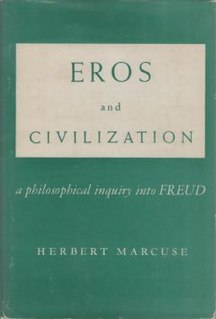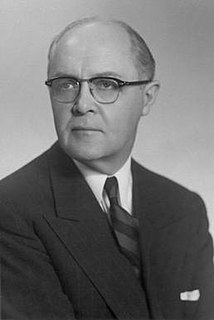
Sigmund Freud was an Austrian neurologist and the founder of psychoanalysis, a clinical method for evaluating and treating pathologies in the psyche through dialogue between a patient and a psychoanalyst.

Non-lethal weapons, also called nonlethal weapons, less-lethal weapons, less-than-lethal weapons, non-deadly weapons, compliance weapons, or pain-inducing weapons are weapons intended to be less likely to kill a living target than conventional weapons such as knives and firearms with live ammunition. It is often understood that unintended or incidental casualties are risked wherever force is applied, but non-lethal weapons try to minimise the risk of casualties as much as possible. Non-lethal weapons are used in policing and combat situations to limit the escalation of conflict where employment of lethal force is prohibited or undesirable, where rules of engagement require minimum casualties, or where policy restricts the use of conventional force. These weapons occasionally cause serious injuries or death; the term "less-lethal" has been preferred by some organizations as it describes the risks of death more accurately than the term "non-lethal", which some have argued is a misnomer.

Foreign Affairs is an American magazine of international relations and U.S. foreign policy published by the Council on Foreign Relations, a nonprofit, nonpartisan, membership organization and think tank specializing in U.S. foreign policy and international affairs. Founded on 15 September 1922, the print magazine is currently published every two months, while the website publishes articles daily and anthologies every other month.

Civilization and Its Discontents is a book by Sigmund Freud, the founder of psychoanalysis. It was written in 1929 and first published in German in 1930 as Das Unbehagen in der Kultur. Exploring what Freud sees as the important clash between the desire for individuality and the expectations of society, the book is considered one of Freud's most important and widely read works, and was described in 1989 by historian Peter Gay as one of the most influential and studied books in the field of modern psychology.
Thespiae was an ancient Greek city (polis) in Boeotia. It stood on level ground commanded by the low range of hills which run eastward from the foot of Mount Helicon to Thebes, near modern Thespies.

Fareed Rafiq Zakaria is an Indian-American journalist, political commentator, and author. He is the host of CNN's Fareed Zakaria GPS and writes a weekly paid column for The Washington Post. He has been a columnist for Newsweek, editor of Newsweek International, and an editor at large of Time.
The October Surprise conspiracy theory refers to an alleged plot to influence the outcome of the 1980 United States presidential election, contested between Democratic incumbent president Jimmy Carter and his Republican opponent, former California governor Ronald Reagan.
Military advisors, or combat advisors, advise on military matters. Some are soldiers sent to foreign countries to aid such countries with their military training, organization, and other various military tasks. The Foreign powers or organizations may send such soldiers to support countries or insurgencies while minimizing the risks of potential casualties and avoiding the political ramifications of overtly mobilizing military forces to aid an ally.

Christopher Lynn Hedges is an American journalist, Presbyterian minister, author, and commentator.

Dark tourism has been defined as tourism involving travel to places historically associated with death and tragedy. More recently, it was suggested that the concept should also include reasons tourists visit that site, since the site's attributes alone may not make a visitor a "dark tourist". The main attraction to dark locations is their historical value rather than their associations with death and suffering. Holocaust tourism contains aspects of both dark tourism and heritage tourism.

Eros and Civilization: A Philosophical Inquiry into Freud is a book by the German philosopher and social critic Herbert Marcuse, in which the author proposes a non-repressive society, attempts a synthesis of the theories of Karl Marx and Sigmund Freud, and explores the potential of collective memory to be a source of disobedience and revolt and point the way to an alternative future. Its title alludes to Freud's Civilization and Its Discontents (1930). The 1966 edition has an added "political preface".

James Luther Adams (1901–1994), an American professor at Harvard Divinity School, Andover Newton Theological School, and Meadville Lombard Theological School, and a Unitarian parish minister, was the most influential theologian among American Unitarian Universalists in the 20th century.

The Seduction of Joe Tynan is a 1979 American political drama film directed by Jerry Schatzberg, and produced by Martin Bregman. The screenplay was written by Alan Alda, who also played the title role.
Richard L. Wolffe is a British-American journalist, MSNBC commentator, and author of the Barack Obama books Renegade: The Making of a President and Revival: The Struggle for Survival Inside the Obama White House. Richard Wolffe is a US columnist for The Guardian. He was most recently vice-president and executive editor of MSNBC.com.
Psychoanalytic criminology is a method of studying crime and criminal behaviour that draws from Freudian psychoanalysis. This school of thought examines personality and the psyche for motive in crime. Other areas of interest are the fear of crime and the act of punishment.
Joseph Nevins is an American author, activist and Associate Professor of Geography at Vassar College in New York.

Robert Greene, is an American author of books on strategy, power, and seduction. He has written six international bestsellers: The 48 Laws of Power, The Art of Seduction, The 33 Strategies of War, The 50th Law, Mastery, and The Laws of Human Nature.
War from the Ground Up: Twenty-First Century Combat as Politics is a 2012 book on war and military strategy written by Emile Simpson, a former British Army officer. The book analyzes the War in Afghanistan (2001–present) in terms of Carl von Clausewitz's theory of war, arguing that modern counter-insurgencies have more in common with domestic political struggles than the traditional state-on-state conflicts described by Clausewitz. The book was favorably reviewed by Michael Howard, a prominent military historian, among others.

Rubem Robierb is a Miami, Florida-based visual artist, sculptor and photographer. His works have earned the attention of the media and art critics, been presented in exhibitions, at art galleries and museums around the world. The artist often uses metaphors to create overflowing images filled with hidden meanings for the viewer. His art is closely associated with the Pop art movement.
Contributors to the online encyclopedia Wikipedia license their submitted content under a Creative Commons license, which permits re-use as long as attribution is given. However, there have been a number of occasions when persons have failed to give the necessary attribution and attempted to pass off material from Wikipedia as their own work. Such plagiarism is a violation of the Creative Commons license and, when discovered, can be a reason for embarrassment, professional sanctions, or legal issues.












